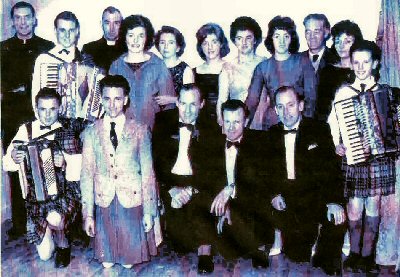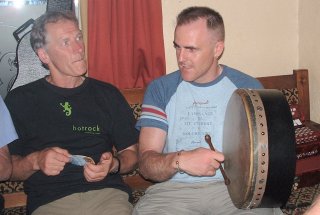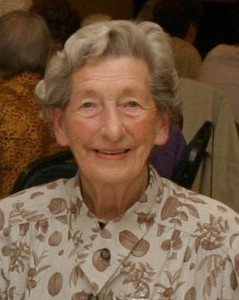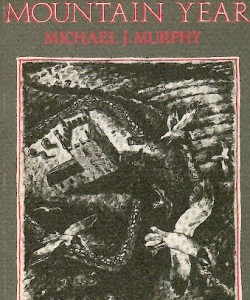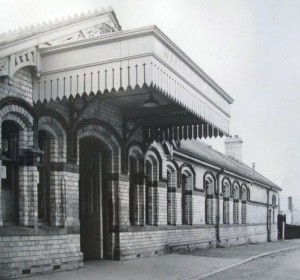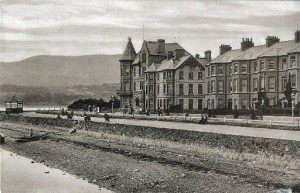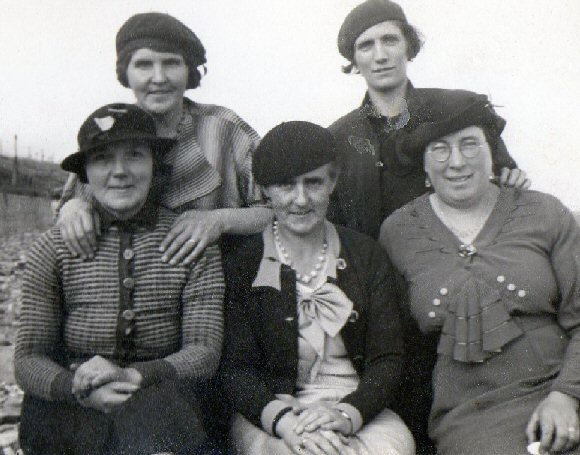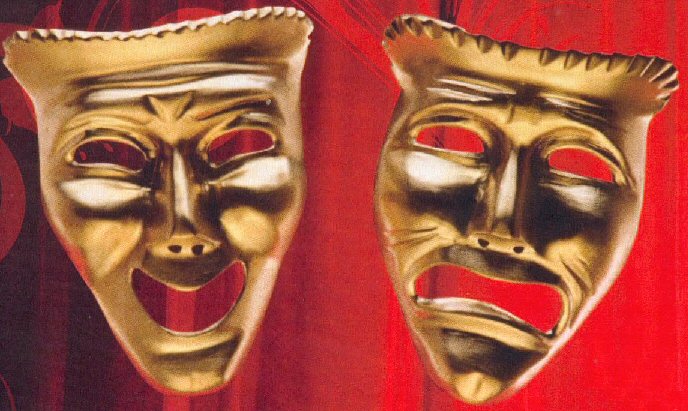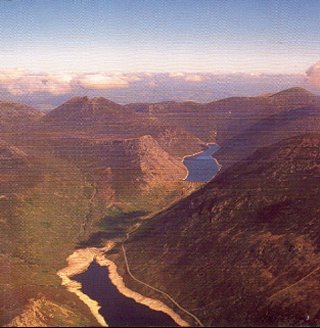Another photo (sorry about the quality – I was promised better!) from our upside-down friend in the Antipodes!
Characters
Banjo Bannon, Everest Hero
What about this man?!!
You can have your Pat Jennings, Peter McParlands, Ronan Raffertys or whoever. You can even have John Mitchel. I’ll take Banjo as our all-time greatest hero, any day. Banjo is THE MAN.
Funeral Oration for Josie Keenan
Funeral Oration for Mrs Josie Keenan (nee O’Hanlon)
My aunt, Josie Keenan, was born Josephine O’Hanlon on 15th March, 1920, youngest in a family of 3 boys and 4 girls to Owen O’Hanlon and Emma McKnight. Her siblings were Danny, my father, Katie, Mick, Emma, Rosina and John and they all lived together in beautiful Clontigora close to Hagan’s Bridge.
This idyllic start was soon disrupted as her mother, Emma, died while Josie was only two; a tragedy compounded by the death of her father, Owen, when she was four.
There was no cohort of social workers to take control and the children may all have been destined for an orphanage but for a far-sighted Parish Priest who declared that the family should be preserved intact.
Danny, then only 17, became the Man of the House and Katie, 16, the Mother. With a resilience that few today could achieve they survived and Josie grew up in a loving environment albeit without luxury. She attended the local Killian Primary School moving on, when the time came, to Our Lady’s and eventually to St Mary’s College in Belfast whereshe trained as a primary school teacher, a career choice which would be to the benefit of many children for the next 40 years.
I heard just recently, living eye-witness accounts of a very tall chemist seen regularly cycling the route from the Dublin Road in Newry out to Clontigora. Oliver and Josie would often be seen “stepping out” around the roads from there to the Flagstaff and beyond in a procedure as old as the hills around them but, no doubt, inconceivably simple to current generations.
They were a cultured young couple and I have seen their names on old programmes of both The Feis and Newpoint Players and Oliver often boasted to me of his on-stage achievements. It wouldn’t be the last marriage to come out of association in those organisations.
After the war there were not a lot of permanent teaching opportunities and Josie subbed in many schools. She particularly mentioned her time in Dromore to which she would travel by bus and complete her journey on a
bike secreted away in the area for the duration of her term there. This bike was crucial to many of her employments. Indeed, Norman Tebbit, many years later might well have based his “on yer bike, plenty of work if you look for it” speech on Josie’s approach to job-seeking. She told me of cycling from Clontigora to Ballyholland to teach.
All this hill work must have given her beautifully crafted legs because in those days, before celebrity culture, with Holywood making inroads even as far as Clontigora, she was referred to locally as Heddy Lamar because of her beauty and, it’s a fair word to use, grace.
In a family of brothers and sisters who, like Spinal Tap, had their amplification systems go all the way up to 11 instead of 10, she was the quiet, calm one who spoke with clarity and knowledge.
Oliver and Josie got married on Easter Monday 1949, the day the Free State became a republic. We don’t know if the two events are associated but you could be pretty sure that Oliver had an opinion on the subject.
The young couple set up their home above Oliver’s chemists dispensary in Hill St and soon moved to Erskine St. First born of this happy union was Maura, soon followed by Una then Tom and finally, Michael.
By this stage the family had moved out to Derrybeg Villas apparently because Josie was a country girl at heart. All was perfect and, if we secretly called him Blessed Oliver Keenan, that is in fact what he was and Josie was devoted to him to her final day.
By this time she was working in the school which was to be her major employment and her happiest time in teaching: St Joseph’s Primary. She made strong friendships with Lilian Donnelly, with whom she worked, and Agnes McConville with whom she had been to school. I have heard many testimonies of her time in St Joseph’s one going as far as to say “your Aunt Jo saved my life. I was in the depths of despair in school until she came along”. She was both gentle and genteel. The most appropriate term I heard to describe her came from one former P3 student: “she was serene”, which, as any teacher will tell you, is some going in classes of up to 40 in those times. Her classroom was an oasis of calm and knowledge.
She dared to follow Oliver on to the golf course but in the course of many Keenan four-balls over the years was declared “a useless golfer”. Her pursuits were more intellectual: she was an avid reader; she had to the last an exceptional mind with a depth of knowledge; had memorised vast numbers of poems and was an avid crossword fan – to the end completing the daily Irish News crossword.
Eventually the family moved into Patrick St, very convenient to the local church. Josie was in every way the epitome of what we refer to in Newry as a “Dominican Catholic”. She was a devout believer and practitioner and most deserving of the term, The Faithful.
The family are most indebted to Martin who brought Oliver and herself Communion every 1st Friday allowing then to continue in the practice of their faith. May I mention one other lady. It is indicative of the old-fashioned and proper way of the pair of them that Mrs Evans, her constant companion and source of support, was always “Mrs Evans”: a lovely indication of old values and the mutual respect they had for each other.
And so the years passed. Maura went to Vancouver and on her many visits home would endure the gentle taunts to retire to Newry. I think Josie admired that spirit of independence. Una married Brian and have Josie and Oliver’s grandchildren, Claire and Mark. They must have paid more tolls on the M1 than any of us in their regular visits to mum and dad.
Tom whose beautiful mind was sadly compromised in recent years, a cause of much heartbreak to her; Michael and Karen with the grandchildren Cheryll, Rory and Kim and, indeed, two great-grandchildren were a tireless source of care and support.
Mary O’Hare was like a spare daughter to her and Gerard also. Any time I would come in she would stare blankly at me and say to all around her: “I don’t know this person. Who is it?” causing me great concern.
The twinkle would come in the eye and she would say,”It’s so long since you came to see me I didn’t recognise you”.
To all the care workers. Thanks are inadequate. They were independent and un-institutionalised because of your devotion. You are priceless.
The Keenans and their children and extended O’Hanlon family kept watch and supported in so many ways for which the family express profound gratitude.
Josie died as she lived, with grace and dignity and we are all diminished by her absence. My greatest memory is of her generosity to me as a young only child without a father and of how she and the entire Keenan clan embraced me, and of her intellect.
I paraphrase Goldsmith:
While words of learned length and thundering sound
Amazed the gazing rustics ranged around,
And still they gazed, and still the wonder grew
That one small head could carry all she knew.
Donal O’Hanlon 8th December 2013
The Good Earth
Moving slowly over the crest of a gentle hill, man, horse and plough are silhouetted against the evening sky. They seem like shadowy ghosts from a dim era that have returned as a quiet reminder to a world dominated by and crazed about speed.
We cannot put back the clock: but it does seem wrong now to associate ploughing with the tractor and the petrol engine: impossible not to feel moved by that scene, with horses straining, their nostrils quivering and blowing out huge trumpets of vapour: to be without the creak of leather harness, straining team and the voice of the ploughman directing the team … and of the plough itself, as the board scrapes against the rising, turning sod.
Without the plough, Empires would crash and Kings would die: for the song of the plough is a song of life. Perhaps that is why poets and artists never tire of depicting plough and ploughman, and the obedient teams.
“Lily? … Hop off, mare! … What are yeh doing, Daisy? … Up on it. Get outa that, ponies – Ah- h… ! Lily! … Daisy! … Come ‘ere now! Come ‘ere with yous !”
When one joins a ploughman and takes a ‘scrape’ it is impossible to escape the symbolism which the turning earth stirs in one’s mind. A rare feeling of the awful importance of the humble task really sings in one’s blood.
The earth is so conservative: and landsmen just as conservative as a result.
… more later …
‘of Retiring Disposition’: Crawford
Shortly before I ‘packed up’ – continued Sean Crawford – ‘I happened to be in our crowded local Post Office. A lady with the invincible inquisitiveness of her sex spoke loudly to me. ‘Is it true, Mr Crawford, that you are soon to retire?’ Everyone stopped talking and looked in my direction. ‘Madam,’ I replied shortly. ‘You know me. I have always been of a retiring disposition!’ She herself retired, not having got any change out of your truly. Around that blissful period, before I’d ‘swallowed the anchor’ (to use a nautical anology) I was often subject to some very subtle catechism. ‘Have you any idea who’s going to get your job?’ I was often asked. ‘No’, I replied, inevitably but gently, ‘I cannot tell you who he will be, but whoever he is, I wish him luck. He will need it!’ … more later …
Sean Crawford in Retirement
I was browsing the other day and came across the retirement reflections of one Sean Crawford of Warrenpoint. These are almost 50 years old so I have to take it that the great Sean has passed on. He has left behind a wealth of reminiscences – and historical notes – which I mine from time to time for these articles.
He was recently retired from teaching at the time, but busier than ever, both in writing, researching, recording and teaching. A bit like myself. Anyway, here are his thoughts!
“I am now ten years retired from teaching and, like Jonny Walker, ‘still going strong’. My ‘Old Age Pension’ now pays for the Income Tax on my teacher’s retirement pension. I have extracted a fairly decent sum out of the authorities who used to pay me twenty-three shillings a week back in 1910 when I had to teach anything up to 60 scholars in three different classes. Some of these were infants: one was three years old, and sent to school to get him out of the road of his parents, who considered the classroom a creche. Nowadays I get three pounds, seven shillings and sixpence Old Age Pension every Monday morning for doing nothing.
Could you bate it?”
… more later …
Frank Hall’s mother etc
John Bowman (RTE Reporter for decades) has favourable mention of Newryman, the late great Frank Hall, an early stalwart of the emerging RTE TV channel, in his recent blockbuster history of that channel entitled ‘Mirrors and Windows’.
The Circus
We relished any opportunity for entertainment in those Golden Days of long ago. Most popular of all was the travelling circus.
The Mourne Men
The local primary schoolchildren of today (Annalong and Moneydarragh Primary schools) composed this musical tribute to Jamie Crawford, and those other Mourne men who perished in the construction of the Silent Valley reservoir.
